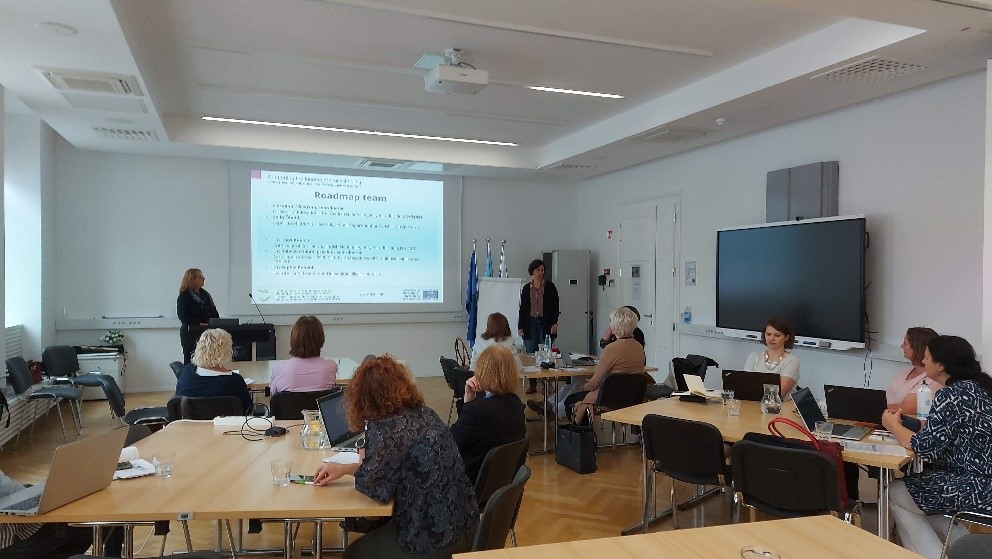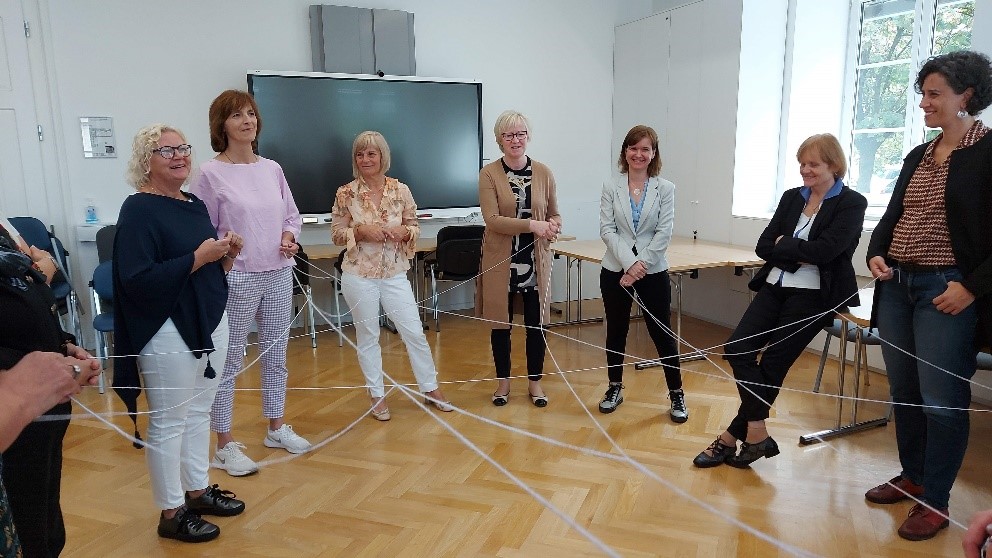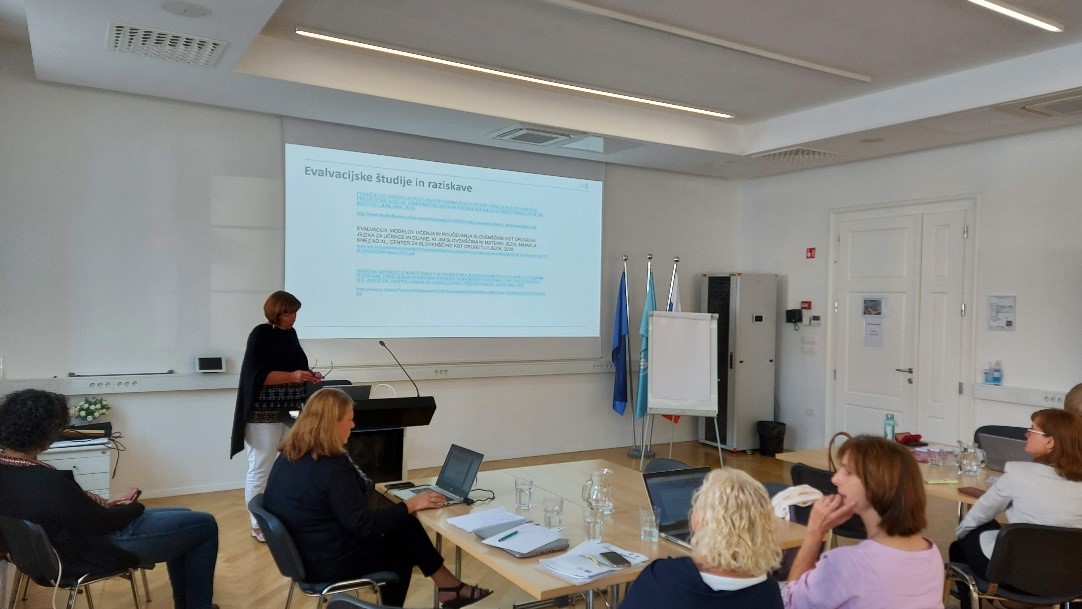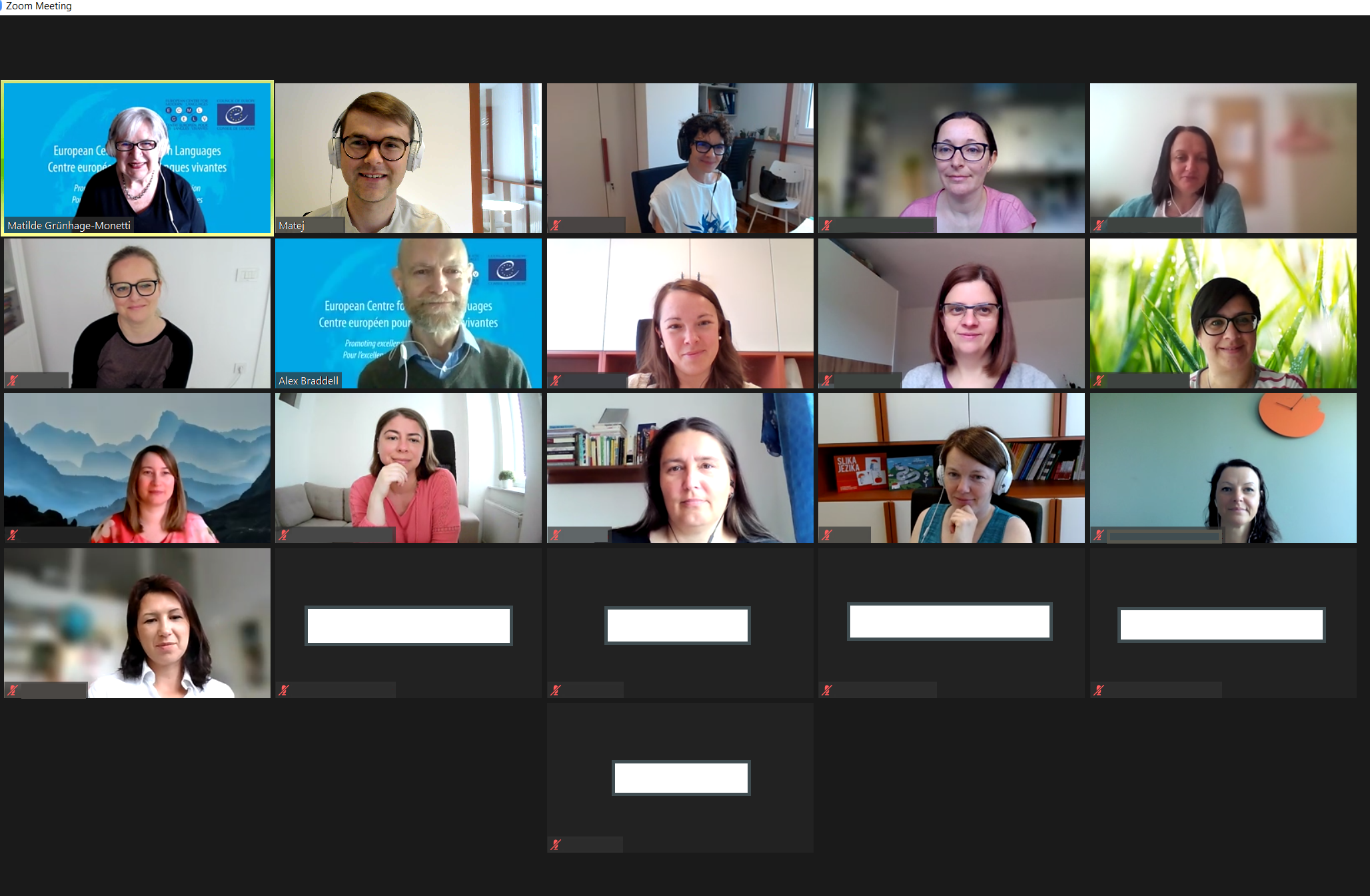News
22.10.2025
Two-day workshop on modern approaches to language teaching – ECML Training and consultancy: MedVITbox 2025 Slovenia
The National Language Working Group, in cooperation with the European Centre for Modern Languages (ECML) in Graz, organised a two-day workshop on October 8 and 9, 2025, aimed at members of the Subject Curriculum Commissions for Languages. The workshop was led by two ECML experts, Maria Stathopoulou (Hellenic Open University, Greece) and Laurent Rouveyrol (Université Sorbonne Nouvelle, France), and was conducted online due to objective circumstances.
A total of 32 participants attended the workshop, including university professors, consultants from the National Education Institute of the Republic of Slovenia, and primary and secondary school teachers.
The training provided participants with insight into current trends in language teaching, based on the CEFR Companion Volume. It introduced an action-oriented and learner-centred approach to language learning, with particular emphasis on the role of mediation in both oral and written communication - within a single language and across languages. Additionally, the importance of plurilingualism, multilingualism, and interculturality in the modern learning environment was highlighted.
Participants explored ways to meaningfully integrate these approaches into planning and everyday pedagogical practice. The knowledge and materials acquired during the workshop will be adapted and used by participants for teacher training activities related to the implementation of the new curricula and knowledge catalogues.
Barbara Lesničar, Zavod za šolstvo (National Education Institute), OE Maribor
More information about the training and consultancy offer of the ECML for member states: "The CEFR Companion Volume: Mediation and other key concepts"
News in Slovenian
Izvedena dvodnevna delavnica o sodobnih pristopih k poučevanju jezikov - Zavod RS za šolstvo
Dvodnevna delavnica o sodobnih pristopih k poučevanju jezikov – Training and Consultancy: MEDVitBoX 2025 Slovenija
Področna skupina za jezike je v sodelovanju s Centrom za moderne jezike iz Gradca (ECMJ) 8. in 9. oktobra 2025 organizirala dvodnevno delavnico, namenjeno članom Predmetno kurikularnih komisij za jezike. Delavnico sta vodila člana ekspertne skupine pri ECMJ, Maria Stathopoulou (Hellenic Open University, Grčija) in Laurent Rouveyrol (Université Sorbonne Nouvelle, Francija) in je bila zaradi objektivnih razlogov izpeljana na daljavo. Delavnice se je udeležilo 32 udeležencev (univerzitetni profesorji, svetovalci Zavoda RS za šolstvo in učitelji osnovnih ter srednjih šol).
Izobraževanje je udeležencem ponudilo vpogled v sodobne smernice poučevanja jezikov, ki temeljijo na dokumentu CEFR Companion Volume. Predstavljen je bil dejavnostno naravnan in za učence osmišljen pristop k učenju jezikov angl. action approach), poseben poudarek pa je bil namenjen vlogi posredovanja v ustni in pisni komunikaciji, tako v enem jeziku kot med jeziki ter pomenu večjezičnosti, raznojezičnosti in medkulturnosti v sodobnem učnem okolju.
Udeleženci so raziskovali možnosti smiselnega vključevanja teh pristopov v načrtovanje in vsakodnevno pedagoško prakso. Znanje in gradivo pridobljeno v delavnici, bodo udeleženci prilagodili in uporabili za usposabljanje učiteljev pri uvajanju novih učnih načrtov in katalogov znanj.
Barbara Lesničar, Barbara Lesničar, Zavod za šolstvo, OE Maribor
12.08.2025
DECODE network meeting: discussing the importance of developing competences for democratic culture (CDC) in young learners through language education
Four DECODE project team members and their ECML consultant met with 19 teacher educators, teachers and researchers at the network meeting which was held at the ECML in Graz, Austria, on 24-25 June 2025. The participants were from Belgium, Bosnia and Herzegovina, Croatia, Germany, Greece, Ireland, North Macedonia, Slovenia, Spain, Sweden, and Switzerland.
During the two-day meeting, participants explored how to foster competences for democratic culture (CDC) in young learners through language education. On the first day, the team introduced the CDC model and discussed challenges in language education, the role of CEFR tools, and principles for developing CDC-related materials. A template for CDC materials was presented, and participants shared best practices and identified teachers’ needs. On the second day, they collaborated in groups to create and present initial CDC teaching materials, offering feedback on the template. Five of the network participants also shared highly interesting testimonials (see below) about CDC’s relevance in their professional contexts and the value of the DECODE project. The meeting strengthened understanding of CDC and highlighted the importance of collaboration for successful implementation of the DECODE project.
Authors: Emina Jelešković, Martina Kramar
- ECML project website “Developing competences for democratic culture for young learners through language education” (2024-26) (available in English and German): www.ecml.at/decode
- Video testimonials of network participants from Bosnia and Herzegovina, Greece, Germany, Ireland, and Sweden: see Recent developments
21.05.2025
Join the Romani-Plurilingual Policy Experimentation (RPPE) webinar

Part of the Closing Conference of RPPE in Bratislava
The Council of Europe is pleased to invite you to a webinar that marks the conclusion of the Romani-Plurilingual Policy Experimentation (RPPE), launched in 2022 in Greece, Slovak Republic and Slovenia. The RPPE has explored ways of using Romani language and culture to support the educational inclusion of Roma pupils in primary education.
Closely linked to the Council of Europe’s Recommendation on the importance of plurilingual and intercultural education for democratic culture (CM/Rec(2022)1), the RPPE has addressed the gap between policy and classroom practice by developing approaches and activities specific to each school’s student cohort and context.
Highlights of the programme:
- Opening remarks – Sarah Breslin, Executive Director, European Centre for Modern Languages and Head of Language Policy, Council of Europe
- Overview of the RPPE and its objectives – David Little, Academic Coordinator
- Presentations by country teams from Greece, Slovak Republic, Slovenia
This webinar offers a unique opportunity to reflect on the practical application of the Council of Europe’s concept of plurilingual and intercultural education in schools and classrooms and to consider their relevance both for the educational inclusion of Roma pupils as well as of learners from other linguistic and cultural minorities.
Join us to learn, exchange and contribute to inclusive education.
Register here until 2 June 2025.
Source: Council of Europe Education Department, 20 May 2025
11.10.2023
Workshop "Supporting the language(s) of schooling" for teachers of English and senior advisers (Ljubljana, 3-4 October 2023)
Date: 3-4 October 2023
Venue: National Education Institute, Slovenia
Local organisation: Barbara Lesničar, National Education Institute, Ljubljana
ECML experts: Nermina Wikström (Sweden), Selin Öndül (Switzerland)
Participants: teachers of English (primary and secondary schools), senior advisers from the National Education Institute
Two experts from the ECML’s Roadmap project, Nermina Wikström (Sweden) and Selin Öndül (Switzerland) together with the National Education Institute of Slovenia, carried out a two day workshop entitled "Supporting the language(s) of schooling". The content of the workshop was focused around three goals: to get an overview of the ROADMAP project; to build a common understanding of the whole school approach and of language awareness; and to deepen knowledge for using ROADMAP tool and the resources. All three goals are key for the successful learning of learners with different language backgrounds.
The participants had an opportunity to try out web-based materials and activities (such as the ROADMAP tool’s coordinators’ package, self-assessment tool, promising practices). These were all based on the whole-school approach which helped them to understand the various dimensions connected to the language development of all learners. The aim was both, to demonstrate and raise awareness of how important the support in academic development in all school subjects for learners with an L1 other than the language of schooling is on one hand and on the other hand to set up a school development plan.
Day 2 of the workshop was dedicated to the customized report which was generated through the self-assessment tool the participants tried out during day 1. The customized report has many benefits for the whole school approach. It reduces the work done by the coordinator, gives systematic feedback, is neutral, uses real data, and connects the levers of progression directly with the promising practices.
This event has allowed participants to familiarize themselves with the basic concepts of whole school approach for learners whose L1 is not the same as the language of schooling and to set up a whole school development plan.
Barbara Lesničar, local organiser
*****
Slovenian version
ECMJ in dve strokovnjakinji iz projekta Roadmap, Nermina Wikström (Švedska) in Selin Öndül (Švica), so skupaj z Zavodom RS za šolstvo izvedli dvodnevno delavnico Supporting the language(s) of Schooling. Vsebina delavnice je bila osredotočena na tri cilje in sicer seznaniti se s projektom Roadmap, zgraditi razumevanje celostnega pristopa šole in jezikovne zavesti ter poglobiti znanje za uporabo orodja ROADMAP in virov. Vsi trije cilji so ključni za uspešno učenje učencev z različnimi jezikovnimi ozadji.
Udeleženci so imeli priložnost preizkusiti spletna gradiva in dejavnosti (paket za koordinatorje, orodje za samoocenjevanje, obetavne prakse), ki temeljijo na celostnem pristopu, kar jim je pomagalo razumeti različne razsežnosti, povezane z jezikovnim razvojem vseh učencev. Namen je bil po eni strani prikazati in ozaveščati o tem, kako pomembna je podpora pri akademskem razvoju pri vseh šolskih predmetih za učence katerih prvi jezik se razlikuje od učnega jezika, po drugi strani pa vzpostaviti šolski razvojni načrt.
Drugi dan delavnice je bil posvečen poročilu, ki je temeljilo na orodju za samoocenjevanje, ki so ga udeleženci preizkusili prvi dan delavnice. Takšno prilagojeno poročilo ima številne prednosti pri uveljavljanju pristopa na ravni šole. Zmanjša delo, ki ga opravi koordinator, daje sistematične povratne informacije, je nevtraleno, uporablja resnične podatke in vzvode napredovanja povezuje z obetavnimi praksami.
Ta dogodek je udeležencem omogočil, da so se seznanili z osnovnimi koncepti celostnega pristopa za učence, katerih prvi jezik ni enak učnemu jeziku in oblikovali celosten razvojni načrt šole.
Barbara Lesničar, local organiser



02.06.2022
"Language for work: How to support work-related language learning for adult migrants": training workshop in Slovenia
Dates: 20 May 2022, 26 May 2022, 27 May 2022
Format: online event
ECML experts: Matilde Grünhage-Monetti, Germany; Alexander Braddell, United Kingdom
Local organiser of the ECML training and consultancy: Matej Klemen, University of Ljubljana, Centre for Slovene as the Second and Foreign Language
Participants spread over three days: 26 teachers of Slovene as L2, experts in the field od L2, organisers of the courses for unemployed learners of Slovene as L2
Working language: English, Slovene
*****
How to support work-related language learning for adult migrants
In May 2022, the Centre for Slovene as a Second and Foreign Language (Faculty of Arts, University of Ljubljana) hosted a workshop "How to support work-related language learning for adult migrants". The ECML experts, Alexander Braddell and Matilde Grünhage-Monetti, considered the specific challenges faced in Slovenia when working with unemployed people in the field of teaching and testing Slovenian as a target language.
During the three-day workshop, teachers and organisers of Slovene courses, as well as other experts in the field of Slovene as a second and foreign language, reflected on three areas in particular: language for employability, learners and their motivation to learn the language, and a supportive environment where language learning can flourish. In addition to their expertise, the presenters offered participants the opportunity to reflect on their own work, as well as lots of materials, simple and effective ways to improve teaching and to help unemployed people to learn Slovene as a second language effectively.
The workshop will undoubtedly contribute to improving teaching practices. It has offered a good starting point for reflection on professional training programmes for teachers teaching Slovene on courses for the unemployed, as well as a reflection on current and future practices in testing of Slovene as a non-first language for professional/employment purposes.
Matej Klemen, local organiser
SLOVENE VERSION
Kako odraslim migrantom pomagati pri učenju jezika, povezanega z delom
Maja 2022 smo na Centru za slovenščino kot drugi in tuji jezik (Filozofska fakulteta, Univerza v Ljubljani) gostili delavnico z naslovom "Kako odraslim migrantom pomagati pri učenju jezika, povezanega z delom" ("How to support work-related language learning for adult migrants". Predavatelja, Alexander Braddell in Matilde Grünhage-Monetti, sta pri pripravi delavnice upoštevala specifične izzive, s katerimi se v Sloveniji soočamo pri delu z brezposelnimi osebami na področju poučevanja in preverjanja znanja slovenščine kot neprvega jezika.
Učitelji in organizatorji tečajev slovenščine ter drugi strokovnjaki s področja slovenščine kot drugega in tujega jezika smo v tridnevni delavnici razmišljali zlasti o treh področjih: o jeziku in zaposljivosti, o učencih in njihovi motivaciji za učenje jezika ter o vzpodbudnem okolju, v katerem se je jezika mogoče učiti. Predavatelja sta udeležencem poleg svojega strokovnega znanja ponudila priložnost za razmislek o lastnem delu, poleg tega pa tudi obilico gradiv, preprostih in učinkovitih načinov, kako izboljšati pouk in brezposelnim osebam pomagati pri učinkovitem učenju slovenščine kot drugega jezika.
Delavnica bo nedvomno pripomogla k izboljšanju poučevalnih praks in bo izhodišče za razmislek o programih strokovnega usposabljanja za učitelje, ki poučujejo slovenščino na tečajih za brezposelne, ponudila pa je tudi razmislek o dosedanjih in prihodnjih praksah pri preverjanju znanja slovenščine kot neprvega jezika za poklicne/zaposlitvene namene.
Matej Klemen, local organiser
